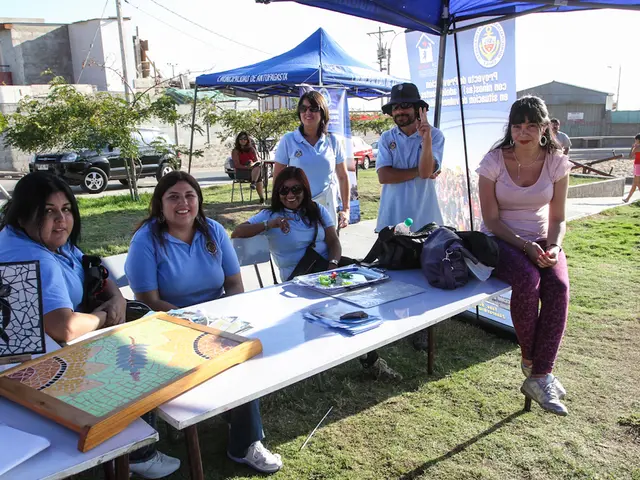Pennsyvlania joins the digital poker arena, legally offering online poker services.
Pennsylvania Hits the Poker Table: State Joins Multi-State Gaming Agreement
On April 24, 2025, Pennsylvania Governor Josh Shapiro officially signed the Keystone State into the Multi-State Internet Gaming Agreement (MSIGA), making waves in the online poker world. With over 13 million residents and a thriving online betting community, Pennsylvania's entry represents a significant step for the agreement and the online poker industry as a whole.
The MSIGA, formed back in 2014, connects poker players across different states, providing a legal and technical framework for interstate gaming. Although each state maintains its regulatory autonomy, the agreement enables the sharing of player pools, boosting game liquidity without compromising user protection standards. Currently, it links Nevada, Delaware, New Jersey, Michigan, West Virginia, and (as of 2025) Pennsylvania.
Larger Pots, Sweeter Wins
With Pennsylvania's accession, the agreement spreads across over 38 million Americans, promising more frequent and higher-prize tournaments, and more competitive games for poker enthusiasts. The Pennsylvania Gaming Control Board revealed that players clamored for their state's participation in the interstate market, citing stronger competition, increased prizes, industry growth, support for smaller operators, and reduced activity on unregulated platforms as persuasive reasons.
information-sharing facilitates trust and integrity
As the player base grows, so does the responsibility to maintain fairness and integrity in online poker. The MSIGA already offers mechanisms to tackle these challenges by promoting information-sharing between member states. By harmonizing regulatory data and resources, states can more effectively detect patterns of collusion, multiple accounts, and even bot use, ensuring a safer environment for all players.
Economic Green
"The tax revenue generated from legalized games in Pennsylvania already tops $2.7 billion annually," shared the Pennsylvania Gaming Control Board. Online poker alone brought in over $30.6 million in 2024, eclipsing the $29 million New Jersey netted. With Pennsylvania on board, these numbers are expected to skyrocket, benefiting schools, the elderly, small businesses, and more.
"This move is a common-sense step to support hundreds of thousands of Pennsylvania residents, bolster our economy, and increase revenue," declared Governor Shapiro.
The regulatory puzzle
Despite the MSIGA's numerous benefits, many states opt to sit out. This conundrum stems from regulatory complexities and legal uncertainties that make joining the compact difficult. To enter the agreement, states need to align their local laws with those of existing member states, a process fraught with sluggish progress due to conflicting laws, bureaucracy, and political obstacles.
Additionally, some states are hesitant to relinquish control over sensitive issues such as player protection and preventing minors from gambling.
A spark for change?
Pennsylvania's entry into the MSIGA could encourage other states to follow suit, shaking up the online poker landscape. As one of the largest regulated markets with a well-established gaming sector, Pennsylvania boasts the potential to spark a domino effect among states still on the fence.
"Joining forces with neighboring states is essential as we navigate the rapidly evolving online market," said Shapiro confidently, acknowledging the importance of multistate cooperation.
The regulatory intricacies surrounding interstate online poker have created a slow expansion of the Multi-State Internet Gaming Agreement across U.S. states. Legal and regulatory uncertainties, disparate state gambling laws, operator expansion challenges, and regulatory compliance requirements have prevented widespread adoption.
Reasons for the limited state participation in MSIGA include state sovereignty over gambling laws, varied legal interpretations of federal laws such as the Wire Act, technical and compliance hurdles, and market size and economic considerations.
Pennsylvania's recent addition to the MSIGA in 2025 demonstrates that overcoming regulatory and political hurdles is achievable, paving a path for future expansion of interstate online poker markets.
Ace your poker game: SiGMA Play connects you to the best online poker sites.
Poker
### SiGMA Poker Tour Takes Over São Paulo* ### Unstoppable Poker Champion: Barrios Dominates SiGMA Tournament*Show all
North America
### Pennsylvania Wins Big by Entering Shared Poker Market### Texas Lottery Director’s Resignation: Was it the $95 million question?Show all
- With the entry of Pennsylvania, the Multi-State Internet Gaming Agreement (MSIGA) now encompasses over 38 million Americans, fostering larger prize tournaments and more competitive games for poker enthusiasts.
- The MSIGA promotes information-sharing between member states, facilitating trust and integrity in online poker by harmonizing regulatory data and resources, enabling effective detection of unlawful practices.
- Online poker alone brought in over $30.6 million in Pennsylvania in 2024, a number expected to skyrocket following the state's accession to the MSIGA, benefiting various sectors of the economy and generating significant tax revenue.
- Despite Pennsylvania's successful integration of casino-games like poker into the MSIGA, some states remain hesitant to join due to regulatory complexities, legal uncertainties, and concerns related to player protection and minors. Despite these hurdles, Pennsylvania's entry into the agreement may serve as a catalyst for wider MSIGA expansion in North America.




